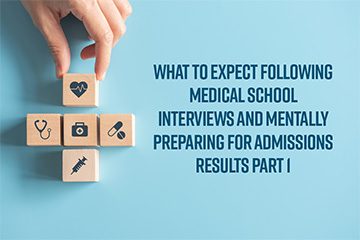
General Medical School Interviewing Tips
Interview season can be nerve-wracking. Just the thought of your upcoming interview can make your palms sweat and heart race. But breath! The hardest part was getting the interview, so with a few tips and practice sessions you will be well on your way to an offer of admissions.
There are several types of interview styles that medical schools across Canada use: traditional panel, multiple mini interview (MMI), modified personal interview (MPI), or a combination of any of these. While each interview style focuses on slightly different goals, here are some general advice that can be applied to all of them.
- Practice, practice, practice! “Practice makes perfect” is cliché for a reason— it works! It doesn’t matter how many stories you have to share about that time you went on a life-changing trip to the Dominican Republic, or knowing the ins and outs of the laws surrounding medical assistance in dying; if you don’t practice telling these stories or explaining your stance on an ethically challenging topic, you won’t get your point across in an effective manner.
- Practice with people who are in medical school or the sciences: This will help you get a fresh and deeper perspective on how you are conveying your answers. The best-case scenario is if you’re able to practice with someone who’s been admitted to the medical school you are practicing for so they can guide you through the process and let you know what they did or didn’t expect on that day.
- Practice with people who are not in medical school or the sciences: I can’t stress this enough! As a future physician, most of your patients will not be in your field. In fact, one of your interviewers may not be in the field. So it will be important that you be able to explain, for example, your research in an understandable way, and also gain a general public’s perspective on certain topics.
- Practice in the setting you intend to have your interview at (for virtual interviews): While a cat jumping into your camera view is cute during class, it will throw you off on interview day. Simulate your interview day as much as you can so you can catch distractors you might not have been aware of— construction, flickering lights, the wonkiness of your chair. If you anticipate wifi issues, grab yourself an ethernet cable to directly connect to the internet.
- Don’t be afraid to say you don’t know: Physicians won’t know everything—and neither will you. That’s why it’s a career of lifelong learning. If you’re thrown a curveball during the interview, don’t be afraid to admit that you are not sure what the correct answer is and explain your thoughts out loud. This will let the interviewers gain an insight into your train of thought and how you work through difficult situations.
- Get to know your interviewers! You will have many different personalities of interviewers, ones that range from warm and chatty to some that may just cut to the chase and want to know your answers. In any case, try to build rapport with them if there is a chance to. You are already stellar on paper, which is why they invited you to the interview. Now they want to know who you really are, and that includes your personality and interests. Let that shine on interview day!






